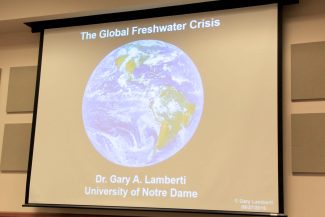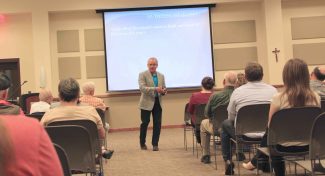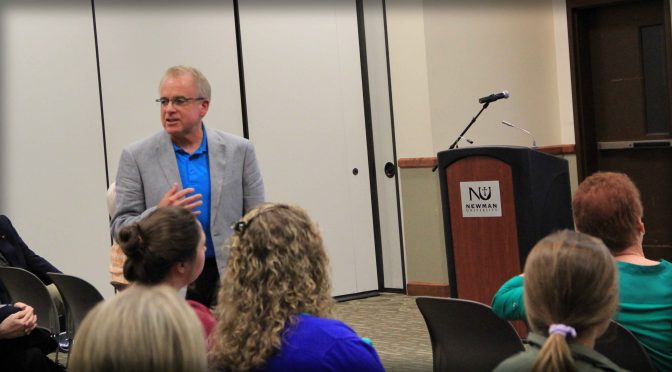Students, faculty and staff were given the opportunity to sit in on a talk about the global freshwater crisis and what solutions are being formed to make a difference. Professor of Biological Sciences at University of Notre Dame, Gary A. Lamberti, Ph.D., traveled to Wichita to speak as part of the annual Hesburgh Lecture Series.

Newman officials worked with William Braun, M.D. of the Notre Dame Club of Wichita to host the lecture on campus in the Dugan-Gorges Conference Center on Wednesday, Sept. 28. Lamberti spoke for about an hour on the challenges the world faces in using water wisely and efforts to conserve when possible.
Lamberti has been teaching at Notre Dame for 27 years while performing his own research on rivers and wetlands. “My graduate and undergraduate students participate in part of my research, too,” said Lamberti. “And this [lecture series] gives me the opportunity to bring that to people who do not particularly have a strong background in the field.”
The presentation was part informational and part interaction as Lamberti kept the audience involved with pop quizzes and awarding points for correct answers saying, “I am a teacher, so you have your first quiz of the night now.” In the end, there was a large-scale tie and Lamberti remarked on how impressed he was with the audience.

Lamberti brought to light the use of water on a global scale and discussed ecological challenges, impacts on the different ecosystems and conservation efforts taking place in all parts of the country. He also spoke about the obligation we have to solve the problems that humans have created, and the partnership between scientists and engineers to realize solutions.
Freshman students at Newman can relate Lamberti’s topic to this year’s common reading book, which is How We Got to Now by Steven Johnson. Noreen M. Carrocci, Ph.D. mentioned to Lamberti that “one of the [chapters in the book] is ‘Clean’, and he talks about how in human history, we didn’t have clean water, or the means of cleaning water in this country until about 150 years ago. Yet there’s great hope that what happened here can happen in developing countries, and that we will figure out a way to do more, in a cost-effective way, in time.”
Lamberti said he enjoyed visiting Newman University and learning about its history while he was here. “It’s really fun to be in a small, liberal arts Catholic institution and see what’s emphasized here. You can see the impression of the sisters that started this place and how their influence still permeates.”

